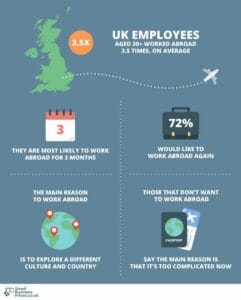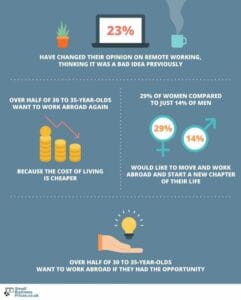
As travel restrictions end and the world fully opens back up again, employees are weighing up whether moving abroad may be the best option for their careers and improved work-life balance.
While all age groups have been affected differently by the pandemic, attitudes towards working abroad and flexible working have shifted.
Small Business Prices have therefore conducted a survey to examine the opinions of employees on both hybrid working and working abroad.
As hybrid working roles and the desire to work abroad are quite prevalent in younger demographics, the survey was conducted with ages 30 and older taking part, to gain the attitude of more experienced employees.
Firstly, those surveyed, who already worked abroad, were asked on their desire to work abroad again. The results found that overall, 72% of respondents approved of the idea of working abroad again in the future.

Demographically, the highest percentage of respondents who would like to work abroad again was interestingly the 36-44 age range, with 79% desiring to work in a different country.
20% of 30-35-year-olds responded that they would not like to work abroad again, the highest of a single age demographic, while 16% of 45-54-year-olds also responded in the same manner.
Those surveyed were also questioned on their reasonings for wanting to work abroad again in the future, let’s examine the reasons behind their desire to relocate for work:
- They’d like to experience a different culture, country and work abroad: 69%
- They think they’d have a better life: 63%
- They’d like to move overseas with their partner: 53%
- The cost of living is cheaper: 53%
It’s interesting to see the biggest temptation for working abroad was the chance to experience a completely different culture (69%). While over half of those surveyed still consider the cost of living a major factor in wanting to work overseas (53%).
The survey also explored the reasoning behind not wanting to work abroad, the results found that 42% believe it to be too complicated now.
23% of respondents stated their current financial situation was the reason behind not wanting to work abroad. While 24% of those surveyed believe it could affect their career negatively.

Another interesting topic explored in the survey was whether participants’ ideas about working remotely in hybrid-working roles were altered as a result of the pandemic.
27% responded that they always perceived hybrid working as a positive, whereas 10% of the 36-44 age range have always viewed hybrid working as a negative and retain that view.
Regionally, it was London that saw the biggest change in opinion, with 44% now viewing remote work as a positive after viewing it negatively in the past.


